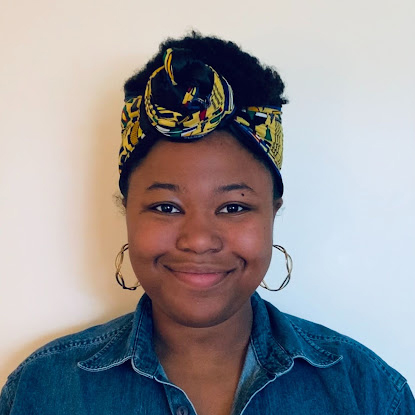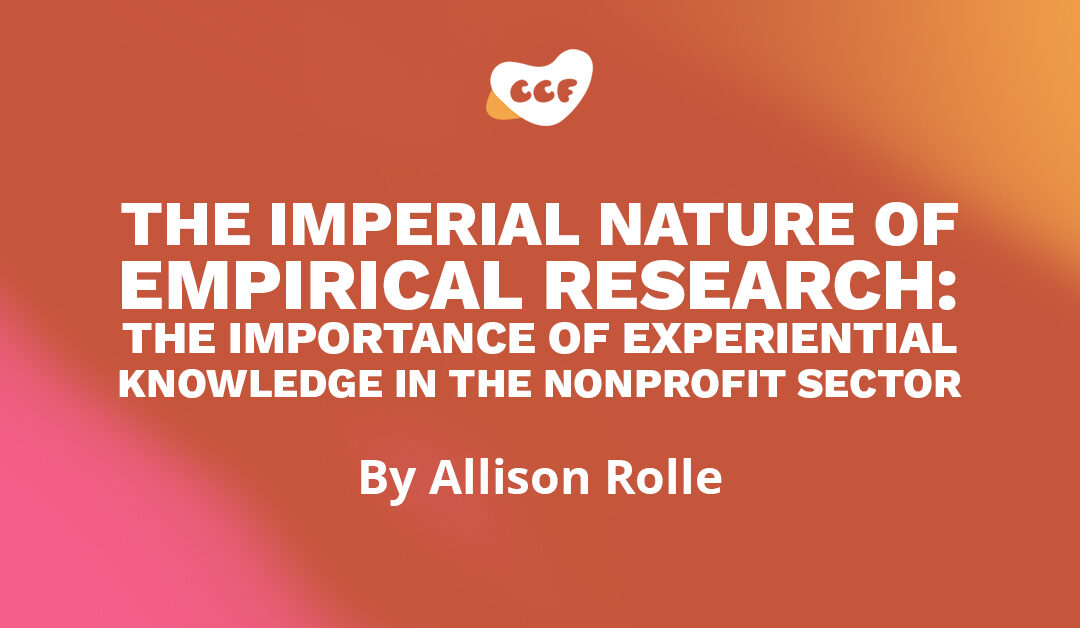By Alli Rolle,Fundraising strategist and fierce community advocate
[The quest for “objectivity”] deprives us of valuable information that contextualizes results and outcomes.
The way we conceptualize knowledge is finite.
We laud the number of theories posited, the amount of tests conducted, or simple studies that barely integrate principles of diversity, equity, and inclusion. What it means to live, however, has been dismissed as “non-empirical,” relegated to being an individual notion of life in a society built on colonialism, racism, and hetero-patriarchy.
As a Black, queer fundraising strategist, this is a reality I know all too well.
When I began in the sector, one of my first tasks was to review a survey aimed at increasing donor diversity. What I read was a surface-level attempt to capture the vast experiences of people of color. Gender identity was limited to the binary, only providing the options of “man,” “woman,” or “other.” The descriptor of other could not begin to contextualize the experiences of 2SLGBTQ+ folks, nor could it encompass the multitude of identities that exist in our community.
The category of race was also defined in ambiguous groups, most prominent to me was the descriptor of “Black.” “Black” did not consider the vast experiences of African diasporas. “Black” could not begin to describe the intersectionality of harm. This descriptor of “Black” implied lives that could be generalized, as did the other broad descriptors that followed.
Since then I have encountered more surveys like this than I can say, but I have rarely seen the incorporation of a life lived. I’ve been told this clashes far too much with the quest for “objectivity,” and that is where the problem begins.
This quest deprives us of valuable information that contextualizes results and outcomes. The continued exclusion of experiential knowledge has led to sweeping generalizations based on race, class, and gender.
Womanist scholar Audre Lorde stated that “the master’s tools will never dismantle the master’s house.” Lorde’s words must serve as a warning if we seek to demolish the colonial foundations of the sector, and what it means to have knowledge within it. Simple surveys can’t quantify the experiences of BIPOC individuals, nor can an A/B test describe the impact of a message or mission.
It is time to embrace experiential knowledge, and that must start today.
Let’s be frank; your reconciliation campaign lacks authenticity without the knowledge of Indigenous communities. Your Pride outreach does little without the voices of queer, trans, and non-binary folx. Your efforts to expand donor diversity are minimized without diverse perspectives, and your knowledge will remain finite without the richness of real-life experiences.
Why We Must Decolonize Research and What It Means to “Know”
For BIPOC, 2SLGBTQ+, and disabled people, research does not indicate an innocent pursuit of knowledge. It is a structure built on exploitation and exclusivity, and within it is the sustained power of colonial ideologies.
The sector’s reliance on wealthy, white donors has shaped research as we know it. Far too many studies have focused on the perception of white donors in an effort to preserve their position as the “savior” of the oppressed.
This model has led to a deficit in our understanding of donors, “beneficiaries,” and the issues communities face on a day-to-day basis. In following this framework, we now have research results and outcomes that are critically under-informed, and this must be addressed immediately.
My mentor used to say, “you may have 15 years in the sector, but I have 40 years of being Black.”
This is a principle that, I believe, should be widely embraced in the sector. The incorporation of experiential knowledge is crucial in the development of anti-colonial and equity-driven initiatives. For many organizations, it is a matter of where to begin.
So, How Do You Start Incorporating Experiential Knowledge?
- Establish Anti-Colonial and Anti-Racist Principles
To incorporate experience ethically, nonprofit organizations and agencies must dismantle their notion of research and the way it “must” be done.
Goings and colleagues proposed anti-racist principles based on Indigenous values and approaches. Some of these principles include the centralization of BIPOC experiences, consideration of intersectionality, an acknowledgment of positionality, self-education, and the prioritization of community engagement.
These principles can be tangibly applied through methods such as capacity-bridging. Capacity-bridging creates a collaborative environment that empowers community while redefining “expertise.” This process requires an acknowledgment of diverse forms of knowing, and it is through this acknowledgment that one can effectively amplify BIPOC, 2SLGBTQ+, and disabled voices.
Cultural humility is key in the application of this method, and the incorporation of experiential knowledge as a whole. This combination of self-reflection and recognition is the first step in embracing anti-racist principles, and constructing paradigms that break the colonial mold.
- Embody the Transformative Praxis
Thambinathan and colleagues outlined the transformative praxis. Its embodiment has three dimensions: theory, values, and practice.
Theory requires the composition of questions that are community inquiries. This means that research must be conducted with – not for – BIPOC, 2SLGBTQ+, and disabled communities. The exclusion of community insight from the composition of theory produces frameworks, processes, and results that remain under-informed. An inclusive theory composition process is essential in producing expansive qualitative research.
In this vein, values should be developed with a community-oriented lens. Through practices such as capacity-bridging, the values of the study, and your long-term objectives, are informed by experiential knowledge.
Finally, practice refers to the capabilities and services researchers offer the community. I also like to view it as what the community provides to the research. In this bi-directional relationship, inclusivity is key. Organizations should actively seek to uplift BIPOC experiences in a collaborative way.
- Provide Space for Truthtelling…and Criticism
To conduct research that successfully serves Indigenous, Black, and other marginalized communities, the data collection process must foster narrative agency.
Research being conducted at the Iyé Creative serves as a wonderful example of how this can be done. Their community-based model examines the experience of food insecurity through the incorporation of experience-sharing. This qualitative research returns agency to African diasporas on Vancouver Island and allows them to direct the narratives regarding their lives and livelihoods. This work also considers the impact of background and intersectionality. In doing so, it doesn’t generalize the experience of food insecurity to “Black” individuals, but analyzes how immigration, employment, and income inequality all play a role.
The incorporation of experience-sharing further expands our qualitative knowledge. For white-led organizations, it also provides space for criticism and adjustment. Through active and continuous dialogue, the pitfalls in research approaches can be highlighted and addressed. It is here where the decolonization of research can truly begin.
Where Can These Steps Take Nonprofit Research?
When knowledge sharing occurs in an affirming and inclusive way, we increase our understanding of issues under-recognized and unaddressed. By uplifting the experiences of BIPOC, 2SLGBTQ+, and disabled communities, we demolish the colonial foundations of what it means to “know” and abolish processes that generalize racialized lives.
It is important to understand that the decolonization of research won’t be achieved in a month, year, or multiple years. This journey requires a continuous commitment to collaboration, a willingness to serve as a student and accomplice, and a reconceptualization of knowledge as you know it.

Alli Rolle
Alli Rolle (they/them) is an award-winning artist, scholar, non-profit leader, and activist. Honoring the legacy of their ancestors, Alli seeks decolonial futurities that bring about collective liberation. Alli’s work centers an Afro-Queer-futurist approach that both critically reflects on – and reimagines – life possibilities for the Black, Indigenous, Queer, and other marginalised people. Outside of the fundraising sector, Alli shifts theory to praxis by creating art-based programs that disrupt the historic and ongoing processes that subjugate marginalised bodies.
Discover more from CCF
Subscribe to get the latest posts sent to your email.

